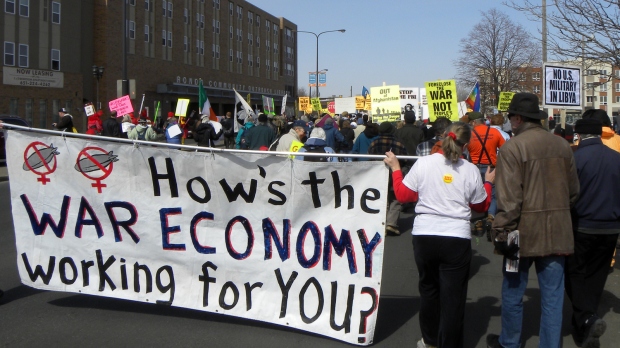
Protesters march through St. Paul, MN down University Avenue and end with a rally on the steps of the capitol building, March 19, 2011. (Credit: Fibonacci Blue / Wikimedia Commons)
GUEST BLOGGER:
Jeffrey St. Onge
Democracy, it seems, is in danger. It is now a well-worn commonplace that our system is suffering; some evidence of this includes low voter turnout (36.4% in the most recent midterm elections), a lack of political engagement (especially among the youth ages 18-30), a lack of knowledge of the basic fundamentals of the American political system (for example, only 65% of citizens could pass a citizenship test in a randomized telephone poll), and a pervasive ignorance about international affairs, particularly those which deal with war and foreign policy. Elected officials represent only a small minority of citizens, and a growing segment of the population appears to lack interest in politics.
It’s not that U.S. citizens are too dumb to figure out how to participate in democracy. As Stanford Communications professor James Fishkin has observed, when presented with information, and when given the time to think about it, most individuals are able to engage in reasonable discussions about complex policy. In other words, it is not a cognitive deficit that plagues the disengaged voting public, but a value deficit. Political engagement is perceived as a choice that is simply not worth the time or effort. This is particularly noticeable among college students. A recent study of University of Michigan students, for example, found that fewer than 50% view themselves as either politically active or informed. These students seem to have decided not to become involved. Why, after all, should they pay attention when there is so much else to do?
The notion of political engagement as a choice is consistent with a culture thoroughly saturated in the logic of neoliberalism. While neoliberalism is a multifaceted phenomenon that guides economic thinking along with social life (often combining the two by framing aspects of social life like education and health care in terms of economics), it is useful here to consider it for its mythic qualities. (more…)

